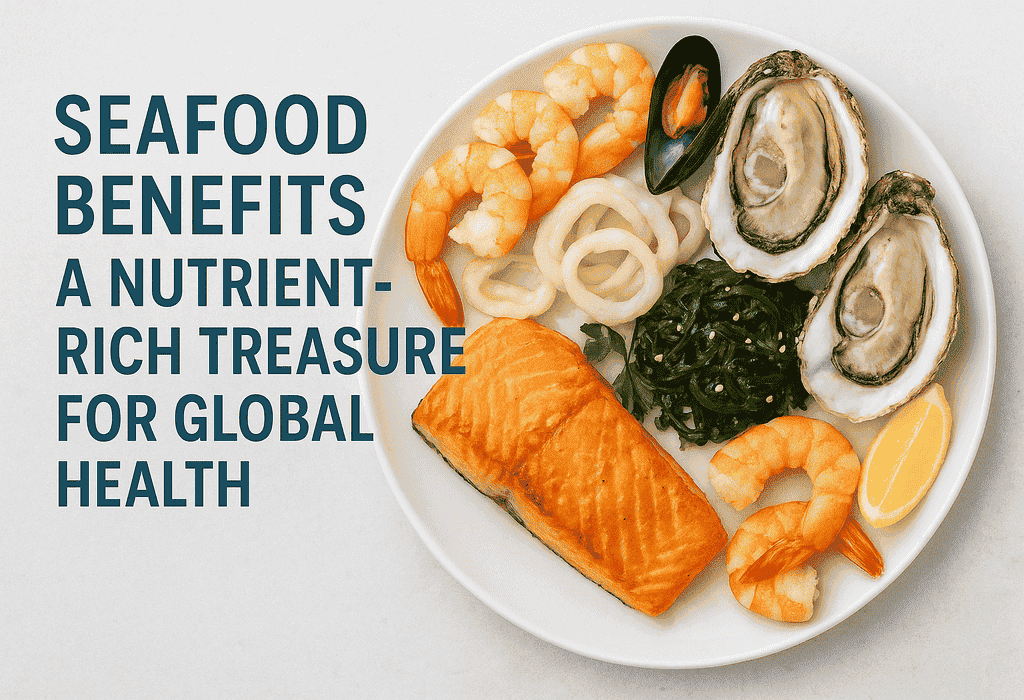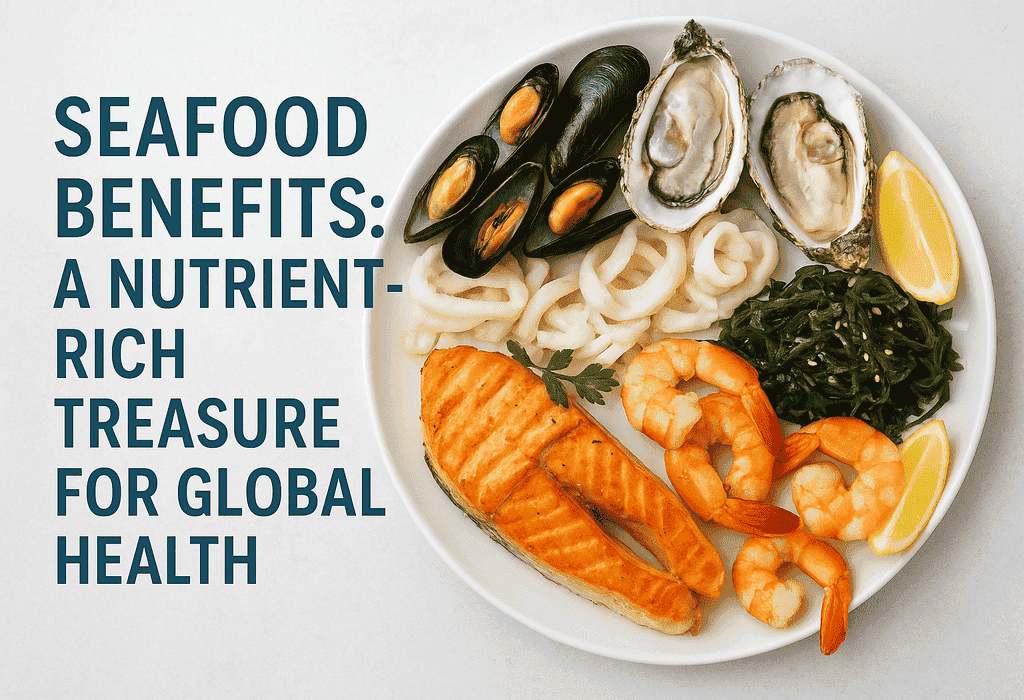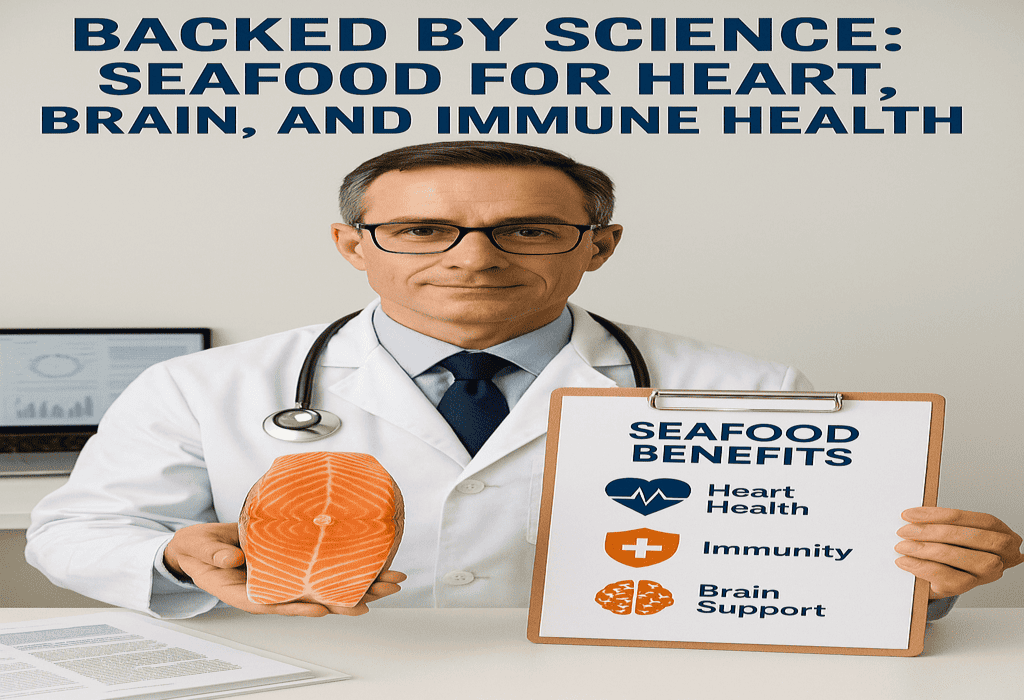
Introduction
Seafood—encompassing fish, shellfish, and sea vegetables (seaweed)—is one of the world’s most nutrient-dense food groups. Regular consumption provides high-quality protein, long-chain omega-3 fatty acids (EPA and DHA), vitamins (including D and B12), and essential minerals such as iodine, selenium, zinc and iron. These nutrients support cardiovascular health, cognitive function, immune resilience, and bone health across the lifespan. Global production and consumption of seafood have risen markedly in recent decades due to population growth, expansion of aquaculture, and rising demand for healthy protein sources; international agencies report record production in recent years. FAOHomeOur World in Data
This article (1) summarizes the principal health benefits of seafood, (2) reviews recent scientific evidence from leading researchers and organizations across Asia, Europe, and America, (3) provides practical guidance on selection, cooking, and safety (including mercury considerations), and (4) supplies a concise nutrient table and references for further reading—optimized for SEO and ready for publication.
Key Points
- Seafood is rich in omega-3 fatty acids (EPA & DHA) that support heart and brain health. PMCMayo Clinic
- Seaweed and shellfish deliver iodine, vitamin D, zinc, and other micronutrients important for thyroid, bone, and immune function. PMCThe Nutrition Source
- Major public health bodies recommend at least two servings of fish per week as part of a balanced diet; guidance for pregnant and breastfeeding people emphasizes low-mercury choices. U.S. Food and Drug AdministrationMayo Clinic
- Sustainability and sourcing matter: aquaculture now supplies a large share of global seafood, but responsible sourcing is vital to protect marine ecosystems. ReutersPMC

Body
1. Cardiovascular Benefits : Why Seafood Protects the Heart
Long-chain omega-3 fatty acids found in fatty fish (salmon, sardines, mackerel) reduce triglycerides, may improve endothelial function, and help lower risk of major cardiovascular events when consumed regularly. Meta-analyses and systematic reviews—including work summarized in Circulation and other journals—report measurable reductions in cardiovascular mortality and improvements in lipid profiles with adequate omega-3 intake. The NIH Office of Dietary Supplements and Mayo Clinic summarize these mechanisms and their clinical relevance for heart disease prevention. PMCBureau des Suppléments AlimentairesMayo Clinic
Practical guidance: Aim for two servings (about 8 ounces) of a variety of seafood weekly as recommended by dietary guidelines; replace processed red meat and saturated fats with fish where possible to gain heart benefits. U.S. Food and Drug Administration
2. Brain Health and Cognitive Aging
DHA (docosahexaenoic acid), concentrated in oily fish, is a structural component of neuronal membranes and supports synaptic function. Observational studies and meta-analyses have linked habitual fish consumption to slower cognitive decline and lower risk of mild cognitive impairment, while some randomized trials show cognitive benefits of DHA supplementation in early or mild impairment. Recent population studies from Asia and North America add to the body of evidence that regular fish intake associates with better cognitive outcomes in older adults. Notable recent contributions include prospective analyses and meta-analyses showing lower rates of cognitive decline among fish eaters. PMCajcn.nutrition.org
Practical guidance : Incorporate fatty fish and omega-3-rich seafood into weekly menus—especially for older adults and women planning pregnancy—to support fetal and lifelong brain development. Mayo Clinic

3. Immune Function, Bone Health, and Micronutrients
Seafood supplies micronutrients that are often lacking in modern diets:
- Vitamin D & calcium (in some seafood and seaweed) aid bone mineralization; shellfish and seaweed can be meaningful sources. PMCThe Nutrition Source
- Zinc, selenium, and B12 support immune function and metabolic health (notably in oysters, clams, and certain fish). PMC
Emerging evidence from nutritional science suggests seaweed-derived compounds may also have prebiotic and antioxidant effects with potential benefits for gut health and cardiometabolic risk factors, though more human trials are needed. PMCScienceDirect
4. Seafood in Weight Management and Metabolic Health
Seafood is high in lean protein and generally low in calories (depending on preparation). Protein supports satiety and lean mass maintenance—useful during weight loss and aging. Additionally, omega-3s have been studied for modest effects on insulin sensitivity and triglyceride lowering, supporting metabolic health especially when seafood replaces calorie-dense processed foods. Bureau des Suppléments Alimentaires
5. Pregnancy, Lactation, and Developmental Considerations
Recent cohort research and systematic reviews from Europe and the UK indicate that maternal fish intake is associated with improved neurodevelopmental outcomes in children, and in some analyses the overall nutritional benefits of fish may outweigh mercury risks for most species. However, leading agencies (FDA/EPA) continue to recommend pregnant or breastfeeding people consume 8–12 ounces (224–340 g) per week of a variety of lower-mercury seafood (e.g., salmon, sardines, cod), and to avoid high-mercury species (shark, swordfish, king mackerel). New studies suggest the need for nuanced guidelines balancing nutrient benefits and contaminant risks. EatingWellU.S. Food and Drug AdministrationMayo Clinic
Practical guidance : Prioritize low-mercury fish; diversify seafood choices; follow local advisories for fish caught recreationally. US EPA
6. Food Safety, Freshness, and Sustainable Sourcing
- Freshness indicators: firm flesh, mild sea smell, and for seaweed, bright, non-slimy appearance. Purchase from reputable suppliers and stores with proper cold chain practices.
- Sustainability: Aquaculture now supplies a significant and growing share of global seafood production. Responsible sourcing (certified fisheries, eco-labels, low-impact aquaculture) helps reduce overfishing and ecosystem harm while meeting nutritional needs. FAO reporting shows record global production but also flags overfishing concerns that require management and consumer awareness. ReutersFAOHomePMC

Table : Representative Nutrients and Health Effects
| Seafood / Sea Vegetable | Key Nutrients | Primary Health Benefits |
|---|---|---|
| Salmon, Mackerel, Sardines | Omega-3 (EPA, DHA), Vitamin D, Protein | Heart health, brain function, reduced inflammation. PMCMayo Clinic |
| Shrimp, Crab | Protein, Selenium, B12 | Muscle maintenance, immune support. PMC |
| Oysters, Clams | Zinc, Iron, B12 | Immune function, energy metabolism. PMC |
| Seaweed (Nori, Wakame) | Iodine, Calcium, Fiber, Vitamins | Thyroid health, bone support, gut health. PMCThe Nutrition Source |
(This table is a concise guide; nutrient content varies by species, region, and preparation.)
Cooking Methods That Preserve Nutrients
- Steaming: preserves omega-3s and water-soluble vitamins.
- Grilling/broiling: good for texture and flavor if cooked briefly.
- Light sautéing in olive oil: retains flavor and healthy fats—avoid deep frying which adds trans/saturated fats and reduces net health benefits.
Conclusion
Seafood is a nutritional cornerstone for a healthful diet—rich in omega-3 fatty acids, high-quality protein, and an array of essential minerals and vitamins. Robust evidence from meta-analyses, prospective cohort studies, and public health agencies in Asia, Europe, and the Americas supports seafood’s role in promoting cardiovascular health, cognitive resilience, immune function, and healthy development in pregnancy. At the same time, attention to sourcing, sustainability, and contaminant risk (notably mercury) is essential. For most people, incorporating two servings of a variety of seafood per week—favoring low-mercury, responsibly sourced options—offers a safe and effective way to enhance nutrition and long-term health. PMC+1FAOHome
Recent Notable Studies & Contributors (selected)
- Khan S.U. et al., meta-analysis on omega-3 fatty acids and cardiovascular outcomes, 2021 — systematic evidence supporting cardiovascular benefits of EPA/DHA. PMC
- Sasaki N. et al., AJCN 2024 — prospective analyses linking fish intake to preserved cognitive function in older adults. ajcn.nutrition.org
- Welty F.K., Omega-3 and cognitive function (review), 2022 — meta-analytic synthesis of DHA/EPA and cognitive outcomes. PMC
- FAO/UN reports and WHO/FAO expert consultations on fish consumption and nutrition (2023–2024) — global production and public-health guidance. FAOHomeOrganisation mondiale de la santé
- University of Bristol cohort analysis (reported in media summaries) exploring pregnancy fish intake and developmental outcomes—adds to debate around mercury vs. nutrient benefits. EatingWell
References & Further Reading
- Khan S.U., et al. Effect of omega-3 fatty acids on cardiovascular outcomes. (Meta-analysis). PMC Article. 2021. PMC
- Welty F.K. Omega-3 fatty acids and cognitive function (review). 2022. PMC. PMC
- Sasaki N., et al. Fish consumption and cognitive outcomes, American Journal of Clinical Nutrition, 2024. ajcn.nutrition.org
- U.S. Food & Drug Administration. Advice About Eating Fish (2024). U.S. Food and Drug Administration
- EPA/FDA Guidelines for Eating Fish That Contain Mercury. U.S. Environmental Protection Agency. US EPA
- National Institutes of Health — Office of Dietary Supplements. Omega-3 Fatty Acids Fact Sheet. Bureau des Suppléments Alimentaires
- Mayo Clinic. Omega-3 in fish: How eating fish helps your heart. Mayo Clinic
- Lomartire S., et al. Overview of the health benefits of seaweeds (review). PMC. 2021. PMC
- FAO. Global fisheries and aquaculture production reaches a new record high (2024). FAOHome
- Khetan A., et al. Are we running out of fish? Fish, health and sustainability (2023). PMC. PMC
- Harvard T.H. Chan School of Public Health. Seaweed & fish nutrition resources. The Nutrition Source
- EatingWell / media coverage on emerging pregnancy fish guidelines (University of Bristol study analysis). EatingWell





